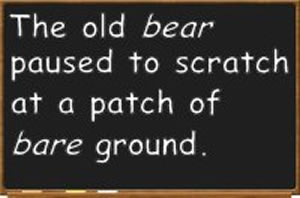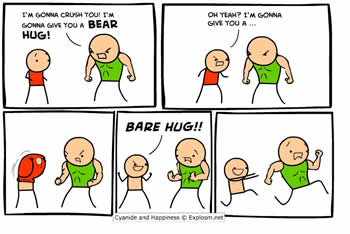Difference between Bare and Bear
Key Difference: The word ‘bare’ is an adjective which describes the state of being bare, i.e. of being exposed or lacking clothing. Being bare refers to being naked or lacking adornment. The word ‘bear’ is pretty obvious, it refers to a huge animal with claws and fur. However, bear can also refer to ‘to hold, to support, to exhibit, to carry oneself in a specified way, to endure, to give birth to, and to yield (especially fruit).’

Bare and Bear are homophones. Homophones are words that have the same pronunciation and phonetic sound, but mean different things. Similarly, bare and bear sound the same but are completely different from each other. These words cause trouble for English learners as well as for native speakers. This is further not helped by the fact that these words in fact have more than one meaning.
The word ‘bare’ is an adjective which describes the state of being bare, i.e. of being exposed or lacking clothing. Being bare refers to being naked or lacking adornment. However, ‘bare’ can also be used a verb, where to bare something means to expose something. This can refer to the body or to an inanimate object such as an artwork or a scheme. Example: a bare body, i.e. a naked body. To bare a scheme, i.e. to expose a scheme.
 The word ‘bear’ is pretty obvious, it refers to a huge animal with claws and fur. However, bear can also refer to ‘to hold, to support, to exhibit, to carry oneself in a specified way, to endure, to give birth to, and to yield (especially fruit).’ For example: to bear weight, bear with me, to bear a child, to bear fruit, etc.
The word ‘bear’ is pretty obvious, it refers to a huge animal with claws and fur. However, bear can also refer to ‘to hold, to support, to exhibit, to carry oneself in a specified way, to endure, to give birth to, and to yield (especially fruit).’ For example: to bear weight, bear with me, to bear a child, to bear fruit, etc.
A simple way to remember which to use, ‘bear’ or ‘bare’, is to note that ‘bare’ is only used in the context of exposing or uncovering something. In nearly every other scenario, ‘bear’ would fit. Furthermore, the term ‘bear’ can usually be exchanges with ‘withstand’. Similarly, try exchanging ‘bare’ with expose to ensure that the word fits there.
Comparison between Bare and Bear:
|
|
Bare |
Bear |
|
Description |
As an adjective, bare means lacking clothing, naked, exposed to view, or lacking adornment. As a verb, it means to make bare, to uncover, or to expose. |
Other than the animal, bear is a verb with a variety of meanings, none of which relate to uncovering or exposing. A few of its meanings are to hold, to support, to exhibit, to carry oneself in a specified way, to endure, to give birth to, and to yield (especially fruit). |
|
Definition (Merriam-Webster) |
|
|
|
Parts of Speech |
Adjective |
Verb |
|
Examples |
|
|
Image Courtesy: grammar.about.com, memecenter.com









Add new comment